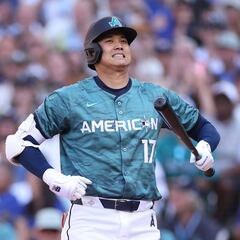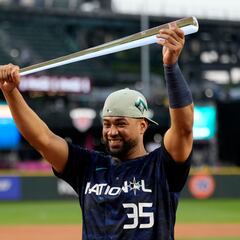2023 MLB Draft analysis: Winners and losers
With the dust settled on the 2023 MLB Draft, we take a look at which programs gained the most from the experience, and which ones lost out.


The 2023 MLB Draft has been one of the most exciting that we have seen in many years. Unlike the NFL and NBA, who make big events out of their draft, MLB has normally held a relatively quiet affair. Added to this, the fact that uniquely among American sports, the MLB can draft payers directly out of high school, and you have a fan recognition issue to contend with.
The MLB Draft
This year, however, the draft has coincided with a thrilling College World Series, a generational group of players on offer, and the first ever use of the Draft Lottery by MLB. The result is that it must be said, before we go any further, that one of the biggest winners is the MLB Draft itself.
Placing the draft in the middle of All-Star weekend is a stroke of genius and the move to that timing in 2021 is starting to pay dividends. Unless the NFL moves the draft to Super Bowl Eve, this could become the premier sports draft in very few years.
White Sox 12th-round pick Mathias Lacombe has become just the second-ever French-born player selected in the Draft: https://t.co/02YpG0ZSFB pic.twitter.com/O33T3mZrR5
— MLB Pipeline (@MLBPipeline) July 11, 2023
Winner: Pittsburgh Pirates
It is impossible to have an analysis of the draft without mentioning the overall first pick. The Pirates wound up double winners in this sense, having won the first pick through the new Draft Lottery despite having the third worst record in the league last season. And the second win was the way that they used that pick to take Paul Skenes from LSU.
A triple-digit fastball with a slider that can slice through any batting order, the very worst that the Pirates will come away with is a Cy Young caliber pitcher. His two-way ability makes him a tasty prospect, depending on how the Pirates decide to use him. With a little luck and a favorable wind, Pittsburgh could be sitting on the next Ohtani.
Winner: Washington Nationals
The Pirates’ luck turned out to be fortunate for the Nats as well, since nobody would have thought that Dylan Crews would go anywhere but Pittsburgh. As it turned out, Crews fell to the Nationals and they grabbed him without a second thought, making them big winners on the night as well.
Crews is the finest five-tool athlete to enter the draft since Bryce Harper, and he is a pure power hitter in the outfield. There is work to do in the minor leagues to be sure, but he is closer to Show-ready than any other player taken.
Loser: Los Angeles Dodgers
The Dodgers picks were all solid for where they landed, and Jake Gelof will certainly repay them handsomely in the coming years. But by being so far over the competitive balance tax threshold, Los Angeles had to wait until several teams had picked twice, and in the case of Seattle three times, before they even got a sniff of the board.
For a team who is not afraid to spend their way to success, this shouldn’t unduly hamstring the Dodgers. They will work the trades and free agency instead. But it sure would have been nice to get something useful without having to spend another fortune to get it.
The Los Angeles Dodgers select power-hitting infielder Jake Gelof from the University of Virginia with the 60th overall pick in the second round of the 2023 MLB Draft. pic.twitter.com/x4vBXd8XHb
— Los Angeles Dodgers (@Dodgers) July 10, 2023
Loser: Oakland Athletics
The A’s took Grand Canyon shortstop Jacob Wilson at number six, and while he has the pedigree as the son of former major leaguer Jack Wilson, he is a contact hitter with no real power. There is nothing necessarily wrong with contact hitters, but it means that few teams wanted to take Wilson in the top ten.
A similar hitter is Tré Morgan, who went 88th to Tampa, and has similar bat-to-ball ability with if anything a much more spectacular defensive skillset than Wilson. There is nothing wrong with either player, but for a number six pick compared to a third rounder, you have to feel that the Athletics came off worse in the negotiations.
Winner: Cincinnati Reds
The Reds have a long history of going all-in on great pitching prospects and this year was no different. They took Wake Forest’s Rhett Lowder, probably the pitcher with the most pitch variety and control in this draft class, seventh overall. They then followed that up by taking Ty Floyd from LSU, who set the College World Series single game strikeout record this year, 38th overall.
Then in the second round, the Reds had luck on their side as a highly-touted prep shortstop, Sammy Stafura, slid down to number 43. A New York-area player, Stafura has been compared to Anthony Volpe. Not too shabby.
Loser: Kansas City Royals
The Royals used their top two picks to take a high school catcher (Blake Mitchell) and high school righty (Blake Wolters) and for that alone, they have to go into the loser column. Nothing against either of those two players, you understand. It is just that taking high school players is problematic in itself, and high school catchers and pitchers are even more so.
The only high school position that any MLB team should consider for a first round pick is shortstop. Generally, at the high school level, the most athletic player on the team is at that spot, and is the one who can transition more easily to another. Left handed pitchers are worthy of a look as well. But righties are almost always destined to languish in the minors before fizzling out completely. Just 15% make it to the Show.
Catchers are generally taken in the low rounds: JT Realmuto in the third, Jonah Heim in the fourth, Yan Gomes in the tenth. This is for a similar reason. If they are eye-catching enough to go in the first round, then they will almost always move away from being a catcher. More than any other position, catching takes time. It is a craft to hone and requires more than just athleticism.
Winner: LSU Baseball
LSU sets a new school record with 13 players being picked in the 2023 MLB Draft, including 8 pitchers and top 2 picks in the entire draft in Paul Skenes and Dylan Crews. The old mark was 10 in 2013.@LSUbaseball pic.twitter.com/NJtTv3m8gW
— Collegiate Baseball (@CBNewspaper) July 11, 2023
Related stories
The biggest winner out of every team or program in the country is probably LSU baseball. They became the first school to field the top two picks overall and three other top-100 picks. Right-hander Ty Floyd went 38th to the Reds, right-hander Grant Taylor went 51st to the White Sox, and first baseman Tre’ Morgan went 88th to the Rays. Overall, there were 13 LSU Tigers selected in the draft, a new record for any single school.
All of this means that LSU has catapulted directly into one of the top baseball destinations in the country, big enough even to be able to lure drafted high schoolers away from MLB. Already there are rumblings about transfer portal moves by some of the biggest NCAA names toward Baton Rouge. Coach Jay Johnson’s recruiting job just got a whole lot easier.

